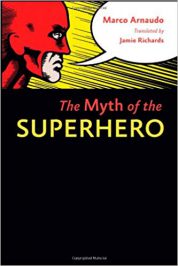When the comic artists of Marvel, DC Comics and other inventors of superheroes, avengers and their allies equipped with supernatural powers or technical gadgets designed their unique subjects, they had – willingly or not – a number of models to build a legend around: Greek, Jewish, Roman, or Nordic mythology.
While each superhero is equipped with exceptional powers, they all more or less are bound to ‘do the right thing’ and obey a codex, serve community, support the weak and poor and help their country.
 Some of the most prominent characters such as Batman, Wolverine, Superman or The Thing also show many other characteristics unique not only in comparison to their ‘co-workers’, but they possess traits also found (or suspected to be present) in the average American, or their forefathers: since all of their fathers once had the status of immigrants and possibly had a different ethnic or religious background.
Some of the most prominent characters such as Batman, Wolverine, Superman or The Thing also show many other characteristics unique not only in comparison to their ‘co-workers’, but they possess traits also found (or suspected to be present) in the average American, or their forefathers: since all of their fathers once had the status of immigrants and possibly had a different ethnic or religious background.
Although there are a few superheroes with Native American background, the average superhero can, in one way or another, be traced back to a certain non-American ethic group. The best example of the superhero is Kal-El, whose name was changed to Clark Joseph Kent, known to most people as Superman. He is the immigrant per se, coming not from a different country but from a different planet altogether, trying successfully to integrate and assimilate; and to be of value not only to his new country but also to his planet.
Another immigrant, Wonder Woman, from a secret island inhabited by Amazons, was not born in the strict sense of the word but used to be a perfect statuette that was bestowed life upon by the goddess Athene. Which is similar to the way The Thing was created, if not by the hand of a goddess, but that superhero truly has a strong resemblance to the Golem in Jewish culture who – we remember – originally was a work of art made of clay only to become alive after a certain blessing and the powerful use of magic.
The author of these and many other ideas is Marco Arnaudo, an associate professor of Italian at Indiana University and an expert in all things superhero. His “The Myth of the Superhero” was originally published in 2010 in Italy; this is the first edition in English dealing with questions as mentioned above and many, many more aspects of superhero culture and their status in current popular culture and their roots in ancient lore and mythology.
Event though this is a rather thin volume, it refers to a multitude of aspects that place the superhero in the role of a fighter for tolerance, diversity and justice; the blueprints of their actions, however, were designed hundreds of years ago.
Review by Dr. A. Ebert (C) 2013
Marco Arnaudo. The Myth of the Superhero. Johns Hopkins University Press, 2013, 206 p.
